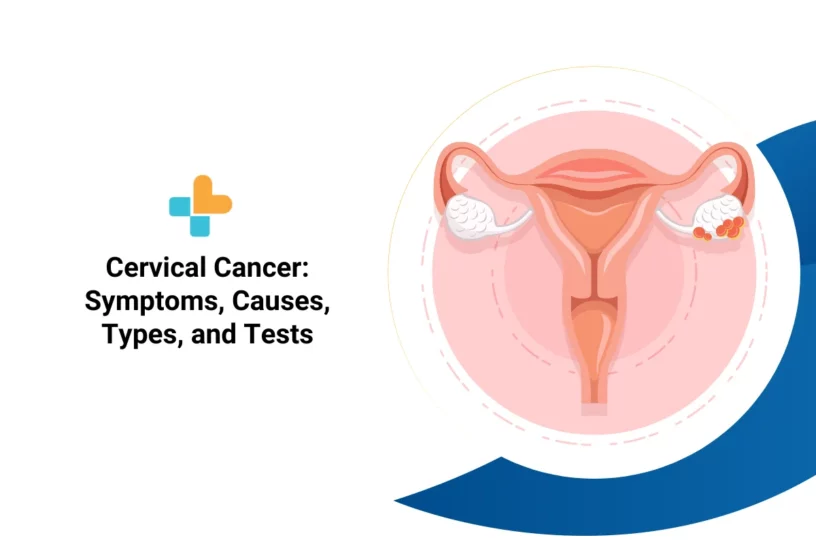Cervical cancer is a pressing global health concern that affects countless women. Understanding cervical cancer symptoms, causes, types, and available tests is crucial for early detection and effective treatment.
Did you know that according to WHO, cervical cancer ranks fourth among women worldwide, with approximately 604,000 new cases and 342,000 fatalities in 2020?
This blog explores the essential aspects of cervical cancer, providing valuable insights to protect your health.
Understanding Cervical Cancer
Cervical cancer grows in the cells of the cervix (the bottom part of the uterus connected to the vagina). It is one of the most common cancers affecting women worldwide.
To better understand this disease, let’s explore its types and their characteristics.
2 Types of Cervical Cancer
There are two main types of cervical cancer.
1. Squamous Cell Carcinoma
Squamous cell carcinoma is the most common type of cervical cancer, accounting for approximately 90% of cervical cancer cases. It originates from cells in the outer part of the cervix, known as the ectocervix.
2. Adenocarcinoma
This type develops from epithelial cells in the cervical canal and tends to be more aggressive.
Cervical cancer can have characteristics of both squamous cell carcinoma and adenocarcinoma. This is known as adenosquamous carcinoma or mixed carcinoma. Cancer develops in other cervix cells only very rarely.
Symptoms of Cervical Cancer
Recognizing cervical cancer symptoms is crucial for early detection and timely intervention.
The following are some common signs that may indicate the presence of cervical cancer.
1. Symptoms of Early-Stage Cervical Cancer
Early-stage cervical cancer may manifest with the following symptoms:
- Women of reproductive age may experience irregular blood spotting or light bleeding between periods.
- Postmenopausal women may have spotting or bleeding.
- Bleeding after sexual intercourse can occur.
- Increased vaginal discharge, sometimes with a foul smell.
2. Advanced Symptoms of Cervical Cancer
As cervical cancer advances, more severe symptoms may appear, including:
- Persistent back, leg, or pelvic pain
- Weight loss, fatigue, and loss of appetite
- Foul-smelling discharge and vaginal discomfort
- Swelling in one or both lower extremities
Also Read : Are Fallopian Tubes the Key to Lowering Ovarian Cancer Risk in Women?
Causes and Risk Factors
Cervical cancer primarily occurs due to the persistent infection of high-risk types of human papillomavirus. Other factors can also contribute to the development of cervical cancer.
The following are the key causes:
- Persistent infection with high-risk types of HPV, especially HPV16 and HPV18
- Weakened immune system
- Smoking
- Early sexual activity
- Multiple sexual partners
- Use of oral contraceptives for an extended period
- Exposure to diethylstilbestrol (DES), a synthetic form of oestrogen, in the womb (rare cause)
Screening and Diagnostic Tests for Cervical Cancer

Many screening and diagnostic tests are available to help women detect cervical cancer early. These include:
- Pap smear: Collects cervical cells to identify abnormalities or precancerous changes.
- HPV testing: Checks for high-risk HPV strains associated with cervical cancer.
- Colposcopy: Examines the cervix using a magnifying instrument to detect abnormal areas.
- Biopsy: Removes tissue for microscopic examination to confirm cancerous cells.
- Imaging tests: MRI, CT scan, or ultrasound to assess cancer extent and stage.
Now that we have discussed the screening and diagnostic tests available for cervical cancer, let’s look at the available treatment options.
Treatment Options for Cervical Cancer
The cervical cancer treatment depends on the stage of the cancer, the patient’s overall well-being, and personal preferences. The following are the most common treatment options:
- Surgery
- Radiation therapy
- Chemotherapy
- Targeted therapy
- Immunotherapy
Uniting Against Cervical Cancer
Cervical cancer is a significant health concern that can be prevented through awareness, early detection, and vaccination against HPV. Understanding cervical cancer symptoms, risk factors, and available screening tests is crucial for women’s health.
At Ayu Health, we emphasize the importance of regular screenings and personalized care. By staying informed and taking proactive measures, we can work towards reducing the burden of cervical cancer and ensuring better outcomes for women worldwide.
References:
https://www.who.int/news-room/fact-sheets/detail/cervical-cancer
https://www.ncbi.nlm.nih.gov/pmc/articles/PMC80972/
https://www.ncbi.nlm.nih.gov/pmc/articles/PMC1839021/
https://www.ncbi.nlm.nih.gov/pmc/articles/PMC145302/
https://pubmed.ncbi.nlm.nih.gov/36222810/
https://ayu.health/blog/womens-health-diagnostics/
Our Hospital Locations
Oncology Surgery Hospitals in Bangalore | Oncology Surgery Hospitals in Jaipur | Oncology Surgery Hospitals in NCR | Oncology Surgery Hospitals in Hyderabad
Our Doctors
Oncology Surgery Doctors in Bangalore | Oncology Surgery Doctors in Jaipur | Oncology Surgery Doctors in NCR | Oncology Surgery Doctors in Hyderabad




